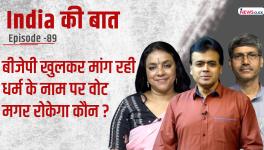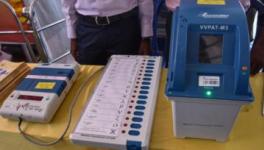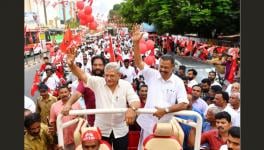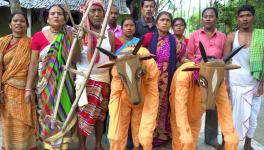India’s Fascist Democracy
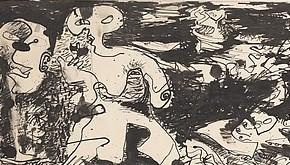
Jackson Pollock, "Untitled", ca. 1943/ metmuseum.org
On May 2, 2017, the present ruling dispensation eventually confirmed the suspicions of sceptics about India being a democracy. The Attorney General, Mukul Rohatgi, told a Supreme Court bench of Justices, A K Sikri and Ashok Bhushan, that citizens could not claim “absolute” right over their bodies. He waxed eloquent with examples – such as the laws against committing suicide, termination of pregnancy and drinking – embarrassing even the Supreme Court. But it did, incidentally, bare the fangs of the beast in the garb of democracy. In effect, Rohatgi’s statement meant that the Indian people, who are supposed to be sovereign, could be sacrificed at the altar of the State at its sweet will.
This is precisely what Mussolini proclaimed in his fascist doctrine. It emphasised the importance of the State, and accepted the individual only insofar as his/ her interests coincided with those of the State. We were supposed to be a liberal democracy that granted citizens certain rights which could not be overridden by the State. Fascism rejects this liberal notion and reasserts the rights of the State. “The concept of freedom is not absolute because nothing is ever absolute in life. Freedom is not a right, it is a duty. It is not a gift, it is a conquest; it is not equality, it is a privilege.” These familiar phrases being thrown around these days by our Jaitleys and Rajnath Singhs are actually the Doctrine of Fascism. In their adoption and reiteration, the Indian State has come to affirm the same fascist doctrine.
Until now we have been told that we have certain rights which were enshrined in the Constitution as fundamental. Article 19 of the Constitution speaks of six rights: the right to freedom of speech and expression, the right to assemble peaceably and without arms, the right to form associations or unions, the right to move freely throughout the territory of India, the right to reside and settle in any part of the territory of India, and right to practise any profession or to carry on any occupation trade or business. We knew they were not absolute, in the sense that they could be circumscribed by legislature in certain circumstances which were spelt out in the Constitution. For instance, Clause (2) of Article 19 of the Indian Constitution enabled the legislature to impose certain restrictions on free speech under the following heads: security of the State, friendly relations with foreign States, public order, decency and morality, contempt of court, defamation, incitement to an offence, and sovereignty and integrity of India. These restrictions were numerous and vague enough to be potentially misused by the rulers who, were, however, expected by the Constitution makers to be gentlemen with a minimal level of morality. The restrictions could be imposed only by a duly enacted law, and not by executive action. But we see this has degenerated to the level where they simply shut people up.
If you say anything which is not a song of praise for the government, you risk your life. You could be easily charged with sedition or under any of the many draconian laws; and imprisoned for life, if not hanged. Sixty six students of the Punjab University were booked on sedition charges merely for protesting against a huge rise in fees. If you speak against the hanging of Afzal Guru or Yakub Memon; or protest against the hooliganism of the Akhil Bharatiya Vidyarthi Parishad (ABVP), as the Ambedkar Students Association in the Hyderabad Central University dared to do, and subsequently the Left wing students of the Jawaharlal Nehru University and others repeated; you could be pushed into becoming Rohith Vemula. Or suffer incarceration as Kanhaiya Kumar, Anirban Bhattacharya and Omar Khalid did. If you speak against the anti-labour policy like the contracting of regular work, if you criticise the management, you could meet the fate of Maruti Suzuki workers, who were incarcerated en masse for years, and are now sentenced to life imprisonment. If you speak against the land grab operation of the government, you could be labelled as Maoist and simply done to death. The Muslims, the “other” of the junta, are, anyway, the anti-nationals and terrorists. The Adivasis in Bastar or Niyamgiri merely spoke out against the unlawful handing over of their forests to the capitalists to incur the State’s dirty war on them. The security forces were unleashed on them to rape and maim their women, and kill their youth with impunity. If you take up cudgels against the State for its crimes against human rights activists, you could meet the fate of Dr Binayak Sen, Soni Sori or GN Saibaba. Last December, a seven-member team of the Telangana Democratic Front (TDF), on a fact finding mission into incidents of human rights violations in Bastar, was arrested on the way. The team is still in Sukma jail, having been denied bail. There is not a shred of evidence beyond the police concoction. These are not isolated examples; they pervade the country.
Indeed, it has degenerated to the level where the State tells people what to speak and to whom; what to eat and where; where to stand and when to sit; whom to love and whom to hate; effectively moulding us into automatons in service to the State. It has raised jingoist nationalism above people and unleashed the Hindutva gangs to carry out its writ, reminiscent of the Blackshirts of Mussolini and the Brownshirts of Hitler. Notwithstanding a plethora of details about the affinity of Hindutva progenitors such as Vinayak Damodar Savarkar, Balakrishna Shivram Moonje, or Madhav Sadashiv Golwalkar to Mussolini and Hitler, the Rashtriya Swayamsevak Sangh, its organisational fountainhead, echoes the Milizia Volontaria per la Sicurezza Nazionale (MVSN, "Voluntary Militia for National Security"), which was originally the paramilitary wing of the National Fascist Party and, after 1923, an all-volunteer militia of the Kingdom of Italy. For the last two and half years, we have seen a working prototype of what a fascist regime is like. It almost echoes ein Volk, ein Reich, ein Führer – "One People, One Empire, One Leader."
India’s claim to democracy or, rather, the world’s largest functional democracy, rests solely on its record of regularly held elections. Although they are more of a ritual observed with massive money and muscle power, and less of an expression of the will of the people, they have sustained the illusion of democracy. In reality, the entire framework, given by the much eulogised Constitution of India, betrays the intrigues of the native ruling classes against the people. The illusion was reinforced by projecting Dr Ambedkar, the messiah of the downtrodden, as its chief architect. His coming out of the dazzle of praise within two years of the working of the Constitution, and disowning it in the strongest possible words, did not help. His warning that what the Constitution gave was just political democracy, and unless it was supplemented by social and economic democracies, the former would not last, also did not work. The de jure democracy has always been de facto plutocracy, the rule of the moneybags. It was a matter of time before it would be transformed into an organised, centralised, authoritarian democracy, which is what fascism is.
The oxymoron in the title sadly characterises this reality of India.
Disclaimer: The views expressed here are the author's personal views, and do not necessarily represent the views of Newsclick
Get the latest reports & analysis with people's perspective on Protests, movements & deep analytical videos, discussions of the current affairs in your Telegram app. Subscribe to NewsClick's Telegram channel & get Real-Time updates on stories, as they get published on our website.









